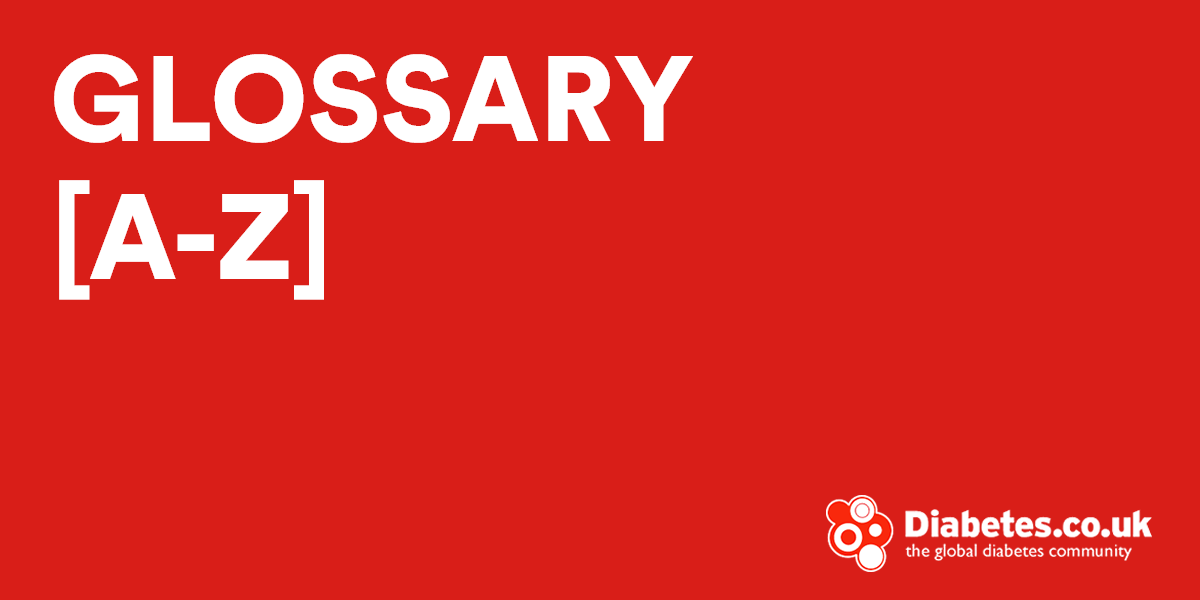This is a glossary of diabetes terms, beginning with A. If you don’t find a term you’re looking for, try Diabetes Jargon
ABPS:
acronym for American Board of Podiatric Surgery Certification.
acanthosis (uh-kan-THO-sis) nigricans (NIH-grih-kans):
a skin condition characterized by darkened skin patches; common in people whose body is not responding correctly to the insulin that they make in their pancreas (insulin resistance) This skin condition is also seen in people who have pre-diabetes or type 2 diabetes
acarbose (AK-er-bose):
an oral medicine used to treat type 2 diabetes It blocks the enzymes that digest starches in food. The result is a slower and lower rise in blood glucose throughout the day, especially right after meals. Belongs to the class of medicines called alpha-glucosidase inhibitors. (Brand name: Precose.)
ACE inhibitor:
an oral medicine that lowers blood pressure ; ACE stands for angiotensin (an-gee-oh-TEN-sin) converting enzyme For people with diabetes, especially those who have protein (albumin) in the urine , it also helps slow down kidney damage.
acesulfame (a-see-SUL-fame) potassium (puh-TAS-ee-um):
a dietary sweetener with no calories and no nutritional value. Also known as acesulfame-K. (Brand name: Sunett.)
acetohexamide (a-see-toh-HEX-uh-myde):
an oral medicine used to treat type 2 diabetes It lowers blood glucose by helping the pancreas make more insulin and by helping the body better use the insulin it makes. Belongs to the class of medicines called sulfonylureas. (Brand name: Dymelor.)
ACNP:
acronym for Acute Care Nurse Practitioner.
ACSM:
acronym for American College of Sports Medicine Certification.
Actos:
see pioglitazone
acute:
describes something that happens suddenly and for a short time. Opposite of chronic
adhesive capsulitis (cap-soo-LITE-is):
a condition of the shoulder associated with diabetes that results in pain and loss of the ability to move the shoulder in all directions.
adult-onset diabetes:
former term for type 2 diabetes
AGEs (A-G-EEZ):
stands for advanced glycosylation (gly-KOH-sih-LAY-shun) endproducts. AGEs are produced in the body when glucose links with protein They play a role in damaging blood vessels, which can lead to diabetes complications
AIYS; Dip Aroma:
acronym for Association of International Yoga School, Diploma in Aromatherapy.
AIYS; Dip Mass:
acronym for Association of International Yoga School, Diploma in Massage.
AIYS; Dip Yoga:
acronym for Association of International Yoga School, Diploma in Yoga Teaching.
albuminuria (al-BYOO-mih-NOO-ree-uh):
a condition in which the urine has more than normal amounts of a protein called albumin. Albuminuria may be a sign of nephropathy ( kidney disease).
alpha (AL-fa) cell:
a type of cell in the pancreas Alpha cells make and release a hormone called glucagon The body sends a signal to the alpha cells to make glucagon when blood glucose falls too low. Then glucagon reaches the liver where it tells it to release glucose into the blood for energy.
alpha-glucosidase (AL-fa-gloo-KOH-sih-days) inhibitor:
a class of oral medicine for type 2 diabetes that blocks enzymes that digest starches in food. The result is a slower and lower rise in blood glucose throughout the day, especially right after meals. (Generic names: acarbose and miglitol.)
Amaryl:
see glimepiride
amylin (AM-ih-lin):
a hormone formed by beta cells in the pancreas Amylin regulates the timing of glucose release into the bloodstream after eating by slowing the emptying of the stomach.
amyotrophy (a-my-AH-truh-fee):
a type of neuropathy resulting in pain, weakness, and/or wasting in the muscles.
anemia (uh-NEE-mee-uh):
a condition in which the number of red blood cells is less than normal, resulting in less oxygen being carried to the body’s cells.
angiopathy (an-gee-AH-puh-thee):
any disease of the blood vessels (veins, arteries, capillaries) or lymphatic vessels.
antibodies (AN-ti-bod-eez):
proteins made by the body to protect itself from “foreign” substances such as bacteria or viruses. People get type 1 diabetes when their bodies make antibodies that destroy the body’s own insulin -making beta cells
A1C:
a test that measures a person’s average blood glucose level over the past 2 to 3 months. Hemoglobin (HEE-mo-glo-bin) is the part of a red blood cell that carries oxygen to the cells and sometimes joins with the glucose in the bloodstream. Also called hemoglobin A1C or glycosylated (gly-KOH-sih-lay-ted) hemoglobi, the test shows the amount of glucose that sticks to the red blood cell, which is proportional to the amount of glucose in the blood.
AOBTA:
acronym for Certified Practitioner – Certified Practitioner Member of the American Oriental Bodywork Therapy Association.
AOCN:
acronym for Advanced Oncology Certified Nurse.
AP:
acronym for Acupuncture Physician
ARB:
an oral medicine that lowers blood pressure ; ARB stands for angiotensin (an-gee-oh-TEN-sin) receptor blocker.arteriosclerosis (ar-TEER-ee-oh-skluh-RO-sis): hardening of the arteries
ARP:
acronym for Accredited Rehabilitation Professional (Canada).
artery:
a large blood vessel that carries blood with oxygen from the heart to all parts of the body.
aspart (ASS-part) insulin:
a rapid-acting insulin On average, aspart insulin starts to lower blood glucose within 10 to 20 minutes after injection. It has its strongest effect 1 to 3 hours after injection but keeps working for 3 to 5 hours after injection.
aspartame (ASS-per-tame):
a dietary sweetener with almost no calories and no nutritional value. (Brand names: Equal, NutraSweet.)
ATC:
acronym for Certified Athletic Trainer.
atherosclerosis (ATH-uh-row-skluh-RO-sis):
clogging, narrowing, and hardening of the body’s large arteries and medium-sized blood vessels. Atherosclerosis can lead to stroke , heart attack, eye problems, and kidney problems
ATR:
acronym for Registered Art Therapist.
ATR-BC:
acronym for Registered Art Therapist; Board Certified.
AuD:
acronym for Audiology Doctorate.
autoimmune (AW-toh-ih-MYOON) disease:
disorder of the body’s immune system in which the immune system mistakenly attacks and destroys body tissue that it believes to be foreign.
autonomic (aw-toh-NOM-ik) neuropathy (ne-ROP-uh-thee):
a type of neuropathy affecting the lungs, heart, stomach, intestines, bladder, or genitals.
Avandia:
see rosiglitazone




